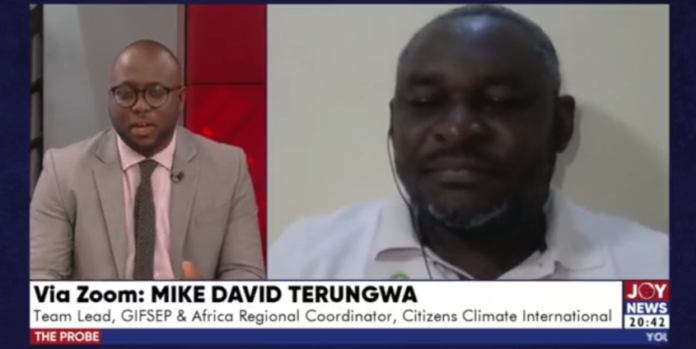The founder and Executive Director of the Global Initiative for Food Security and Ecosystem Preservations (GIFSEP), David Michael Terungwa is rebutting claims being made by the government that about 10 million trees have been planted in the Atewa forest reserve.
According to him, he paid a visit to the forest around June 2022 and discovered that there had been more forest loss due to mining in the area than there had been trees purportedly planted.
While contributing to a discussion on The Probe, Sunday, he told the host, Blessed Sogah that “as my colleague is speaking about 10 million trees and 20 million trees, my mind went back to what I saw at Atewa Forest, and I can clearly say that it is easy to say that 10 million trees have been planted but it is quite difficult to point out where those 10 million trees are.”
It would be recalled that on June 10, 2022, President Nana Akufo-Addo launched a project dubbed the ‘Green Ghana project,’ as an initiative to promote environmental protection and climate change mitigation.
During the launch of the project, the government disclosed that it had a target to plant 20 million trees in 2022 nationwide.
But some Environmental NGOs such as A-Rocha Ghana expressed doubt about the government’s ability to achieve its set target due to factors such as reclassification and de-gazetting of the Achimota Forest, as well as the handing out of the Atewa and Nyinahin Forests for Bauxite mining by government.
However, 1.000 trees were planted in the Atewa Forest at Segyimase by the Kyebi District Ghana Forestry Commission in collaboration with the UNDP and the Okyeman Environment Foundation during the second edition of the Green Ghana Day project in 2022, to replace the lost trees in the forest.
Mr Terungwa further stated that after these projects have been publicly commissioned, the effort involved should be to ensuring that the plants survive.
He eventually challenged anybody to visit the locations where the trees were planted in order to observe the development and verify his statements for themselves.
Mr Terungwa eventually acknowledged that it was good that Ghana was among African countries that received carbon credit, but he stated that he and his colleagues often considered that not to be a solution.
He explained that, in his opinion, the people who deserved to receive the carbon credits were the hosts in the communities whose livelihood and survival depended on the forest.
“They are the ones that actually deserve to be given carbon credit for protecting the forest,” Mr Terungwa emphasised.

